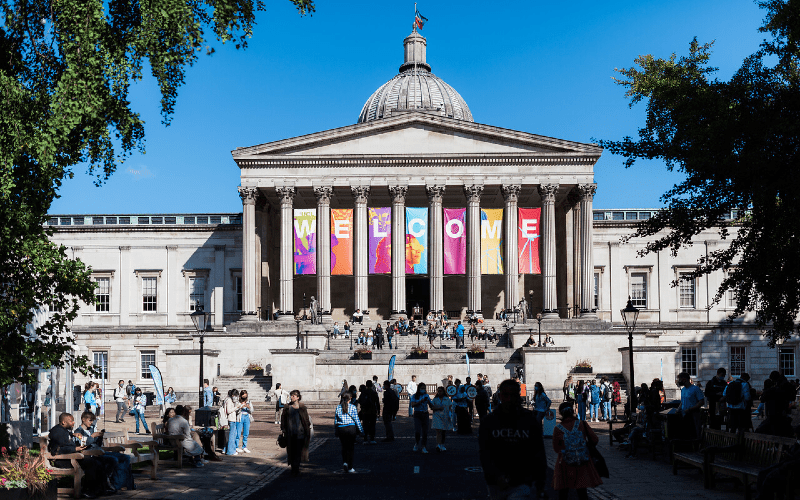UCL (University College London) is a highly prestigious public research university located in the heart of London and ranked 9th in the world (QS, 2024). Established in 1826, it has the largest postgraduate enrollment in the UK and is a member of the Russell Group of leading British universities.
Study at University College, London!
Get in touch with us for more information about studying abroad!
UCL (University College London) has produced 30 Nobel prizewinners and three Field’s medallists and has been placed 2nd , globally, by THE for research power and influence. Among its alumni, you will find Francis Crick, Jomo Kenyatta, Joseph Lister and Otto Hahn, while John Stuart Mill and Mahatma Gandhi followed courses at UCL when it was still a college.
In This Blog:
UCL (University College London) is a founding member of the Alan Turing Institute. It has many international links and works with Yale and leading universities in Australia, China, Canada, India, Japan Singapore and Thailand. UCL offers joint and dual degrees with Columbia University, the University of Cologne, New York University and the University of Hong Kong – among others. UCL students can also undertake exchanges with world-class institutions such as Caltech, Columbia University, Washington University, UPenn, the University of Chicago, Dartmouth College, UCLA and UC Berkeley.
UCL’s multi-disciplinary approach to learning has earned it a global reputation as a centre of teaching excellence, which has attracted 47,000 students, half of whom are postgraduates, and the highest number of international students in the UK.
UCL’s academic organisation
UCL has 11 faculties:
- Arts and humanities
- Build environment
- Brain sciences
- Engineering
- IOE (Education and society)
- Law
- Life Sciences
- Maths and Physical sciences
- Medical sciences
- Population Health sciences
- Social and historical sciences
and 100 departments, alongside a number of research centres.
UCL is ranked in the global top ten for a wide range of subjects (QS,2023), including :
- Education -1
- Architecture and build environment- 1
- Archaeology- 3
- Anthropology -4
- Pharmacy and pharmacology – 4
- Psychology- 5
- Geography -6
- Medicine – 6
- Anatomy and physiology -6
- Biological sciences -8
UCL is also highly ranked for its courses on:
- American studies
- Linguistics
- Building
- Speech and language therapy
- Liberal arts
- Construction, surveying and planning.
UCL’s academic year is divided into three terms, with most departments organising reading weeks in November and in February.
UCL has branched out into a range of innovative initiatives designed to make education available to a wider audience, in addition to providing a traditional academic journey.
UCL’s groundbreaking enterprises typify the spirit of UCL – to push the boundaries of knowledge and share findings with the world. The university launched UCL Discovery, an open-access repository where all research outputs and theses are stored. It also has its own open-access publishing arm, UCL Press, which publishes journals, monographs and textbooks which are free to download. In addition, the university set up UCL Business, a technology transfer company which supports and creates spin-offs and offers project management and consultancy services.


UCL – research output
UCL researchers have :
- discovered a new section of the periodic table: the five noble gases
- invented the vacuum flask
- created a new cancer therapy which uses MRI to guide a seed through the brain and kill tumours
- designed eye therapy based on stem cells
- restored biodiversity to Brazil’s Atlantic Forest
- set up a personal finance platform for the elderly
- improved sustainable rice production in South-East Asia
- found a way of turning coffee into clean energy
- designed methods for inducing HIV remission
- discovered the existence and function of hormones
UCL’s reputation for outstanding research means that the postgraduate arm of the university is highly oversubscribed and the acceptance rate for postgraduate applicants is 23.5 per cent.
University College, London – applications
Although UCL’s admission rate is 29 per cent, this is an overall figure and certain undergraduate courses are more competitive than others:
- BFA -3.7 per cent acceptance
- BA Fine Arts- 4.8 per cent
- LLB Law- 9.1 per cent
- Statistics and Management for Business -9.4 per cent
- Media -9.5 per cent
- Management science -11 per cent
- Psychology- 11 per cent
- Architecture -11 per cent
Contrast these figures with the least competitive undergraduate courses:
- French and Italian -97 per cent acceptance
- Italian and Spanish -96 per cent
- Earth Sciences -94 per cent
- Spanish and Latin American Studies -93 per cent
- German and History -91 per cent
- Classics -91 per cent
- Russian and Spanish -90 per cent
UCL receives the most applications for the following subjects:
- Law
- MB medicine
- Computer Science
- Psychology
- Architecture
- Biomedical sciences
- Politics and International Relations
UCL is part of the UK’s UCAS centralised application system -see Study in the UK for further details. Contact Elab if you have any questions on how to apply through UCAS, which documents you will need to provide and upload, deadlines, costs etc.
NB: Applicants who wish to study medicine will have to sit the BMAT
Applicants to European social and political studies will need to sit the TSA exam
Applicants to study law are required to sit the National Admission Test for Law.
UCL invites international students whose grades may not meet entry requirements to take a one year foundation course, known as the Undergraduate Preparatory Certificate. This follows two pathways, Humanities or Science and Engineering, and greatly increases your chances of transferring onto a degree course. For further details, get in touch with Elab.


University College, London – campus life
UCL Accommodation
University College, London has two campuses in central London. One is around Gower Street, a conservation area in the heart of the capital, while UCL East is located in Olympic Park, Stratford, a short hop away on the underground. University College, London East is expanding and can currently accommodate around 600 students, while UCL as a whole provides 26 halls of residence for 7,000 students. First year undergraduate and postgraduate applicants are guaranteed a place in the halls of residence as long as they commit to accepting their offer from UCL by the end of July, and have not lived in London before while studying.
Being a constituent college of the University of London, UCL opens up additional housing options for you, including the opportunity to apply for intercollegiate halls, engage in house-sharing arrangements, or explore private rental accommodations.
University College, London campus activities
UCL has over 250 societies and clubs, spanning a wide range of activities from sport to debating. Of course, UCL students are also able to access everything this amazing capital city has to offer, from theatres to galleries and cutting-edge exhibitions and pop-ups. UCL owns three museums of its own, which are well worth visiting:
The Petrie Museum (Egyptology)
The UCL Art Museum
The Grant Museum of Zoology, with its unique collection of dodo bones.
Whatever you interests, from rugby to track, politics to dance, you will find an outlet for them if you study at UCL.
The UCL campus itself is moving rapidly towards eliminating all single-use plastics and reaching its goal of 85 per cent recycling. In addition it promotes the circular economy and biodiversity and is working to create a sustainable environment.
UCL traditions
UCL is administered by a college council. One interesting tradition is including the utilitarian philosopher, Jeremy Bentham- who left his body to UCL – in the meetings, and gravely stating that he is “present but not voting” .
University College, London mascot, Phineas, a kilted Jacobean Highlander, was originally stolen from outside Catesby’s Flooring, a shop in nearby Tottenham Court Road. The company eventually gave the statue to UCL, whose rivals, King’s College London, stole it in turn.
Reggie the Lion, KCL’s mascot, became involved when UCL students desecrated a very personal part of his body, cutting it off with a tin opener. KCL responded by covering Phineas in tar and feathers , painting him red and dumping him in the Strand. All this was just fun and games, but matters became serious when KCL stole the head of Jeremy Bentham, the philosopher, and demanded a ransom – which University College, London paid – to return it. To further complicate the situation, Queen Mary, London, then also tried to capture Reggie and buried him on Hampstead Heath after cutting off his tail. This long-standing rivalry now continues on the sports field, where matches between the three protagonists are keenly fought and have a very personal element…
UCL – an outstanding university
The UK department of Education estimates that graduates from UCL earn 15.5 per cent (women) and 11.2 percent (men) more than their peers on finishing their studies. This demonstrates that the university’s reputation makes its alumni extremely attractive to potential employers.
If you wish to combine excellent teaching with all that London has to offer, then contact Elab and start working with us to prepare your application to University College, London. You will have an amazing educational experience.




